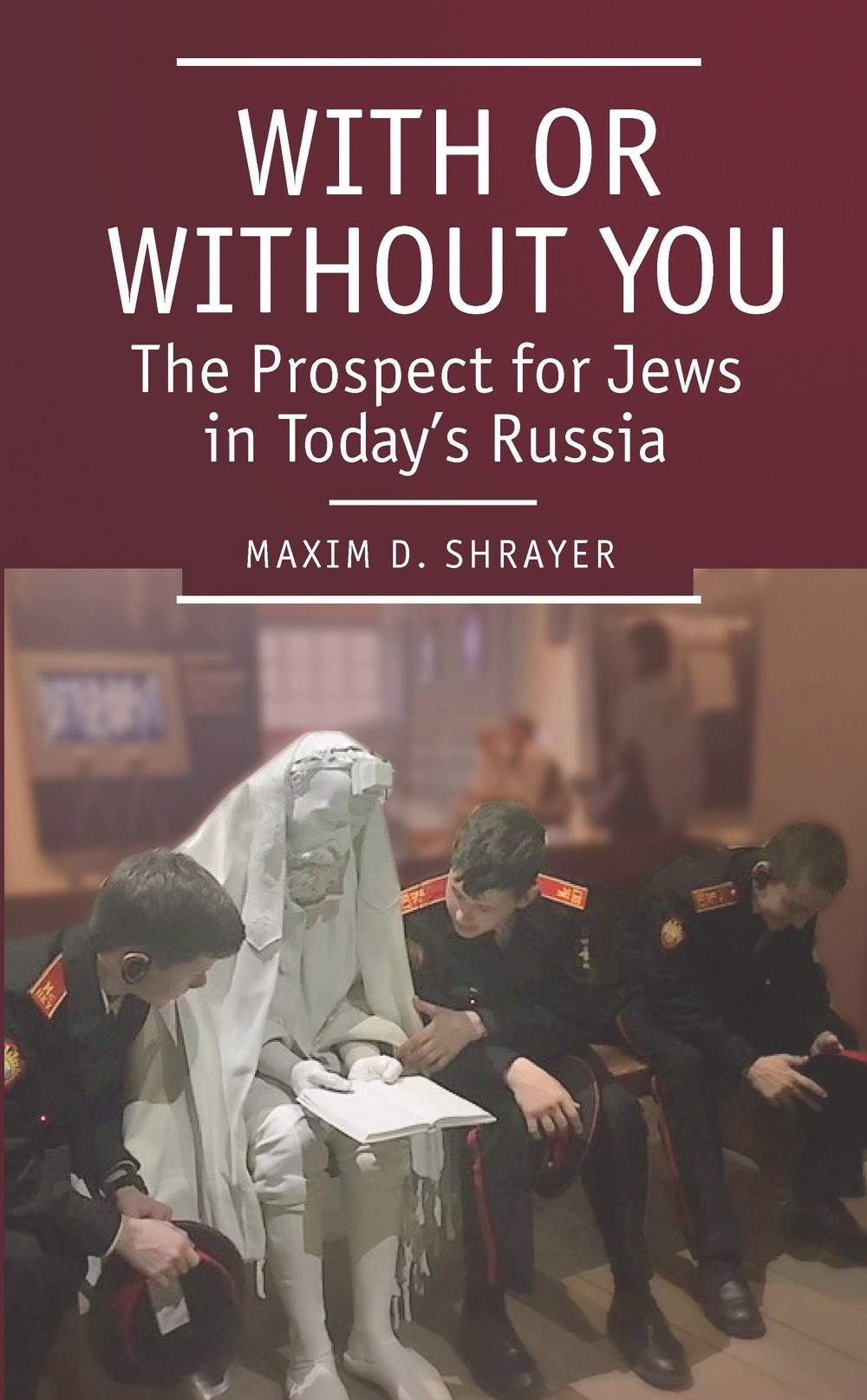
When considering the “Free Soviet Jewry” movement that peaked in the 1980s, it’s easy to focus on the romantic notion of liberation. After all, over a million Jews left the Soviet Union for Israel and the United States, making the movement a crown jewel of communal activist success.
But such success is hardly the complete story.
What’s missing from the narrative of liberation is the complexity of cultural nostalgia — the visceral pull of a homeland, even when that homeland has betrayed you.
In Maxim D. Shrayer’s study “With or Without You: The Prospect for Jews in Today’s Russia,” the complicated nature of what it means to live as a Jew in Russia is delicately addressed. Shrayer was born in Moscow in 1967 and, with his family, spent nine years as a refusenik before emigrating to the U.S. in 1987. Having written and translated numerous books, including two memoirs, Shrayer has become an expert in Russian-Jewish literature and culture.
This newest study details his trip to Russia in 2016 with his fifth-grade daughter, Mira. Like most good Jewish works, Shrayer’s begins with a question that compels us to ask further questions. In the prologue, Shrayer asks Oleg Dorman, a Jewish filmmaker living in Russia, a complicated question: “Why do you stay here?”
What’s missing from the narrative of liberation is the complexity of cultural nostalgia — the visceral pull of a homeland, even when that homeland has betrayed you.
Dorman says poignantly, “G-d gave me as a Jew such a place in life — to live in Russia.” It’s a startling answer to a seemingly simple question. And the idea that God chooses where people will live (and die) is a distressing notion. But it is in this fashion that Shrayer begins his book.
In Moscow, there is a Jewish Museum and Tolerance Center, founded in 2012. It is a miracle that such a place should exist, given the long history of Russian anti-Semitism and the plight of Jews in Russia only decades ago, namely the Soviet Union’s efforts to “annihilate Judaism and traditional Jewish life.” Yet even the remarkable presence of such a place in Russia is unsurprisingly fraught.
Dorman tells Shrayer that when a tram stops at the museum, it is announced only as the “Museum and Center of Tolerance,” all references to Jewishness glaringly omitted. It’s hard to believe, and so Shrayer decides to see for himself, and takes the tram to the museum to discover that the announcement for the stop has indeed been cleansed of all Jewish references. It is a tram stop “already loaded with the baggage of Soviet antisemitism” in a society where the word “Jew” is “somehow indecent,” not something said out loud.
The narrative of Shrayer’s journey through Moscow is interspersed with memories of his own childhood in Russia, and the omission of the word “Jewish” from the tram stop announcement reminds him of his sixth-grade peers laughing hysterically at the mention of the word “Jew” in relation to a composer’s score known in Russia as “Two Jews: Rich and Poor.” Shrayer recounts how the word “Jew” itself was worthy of derision, and so to them the idea of two Jews was especially dirty and hilarious.
A question addressed, however, is whether the omission of the word amounts to real anti-Semitism or whether it is simply a vestige of Soviet discrimination that has lost its meaning and impact. Recent surveys of Moscow residents suggest that Jews are in ninth place as “targets of antipathy,” falling below Roma and Tajiks, as well as Americans, Ukrainians and Armenians. Shrayer agrees that overtly anti-Semitic behavior in Russia has declined considerably in the post-Soviet era, although he is not as optimistic as the study’s authors, who claim that “the dominant attitude toward Jews is that of moderate respect,” and that “negative connotations are largely gone.”
But if anti-Semitism has truly declined in Russia, where have all the anti-Semites gone? History suggests that anti-Semitism never really disappears, but only shrinks beneath the surface to bubble up in new ways. Shrayer draws an important distinction between Russia’s “professional Jew-haters” — politicians and extremists publicly espousing anti-Semitic rhetoric — and average citizens. While public denunciations of Jews are fewer, anti-Semitism’s “putrid flowers continue to bloom” particularly on social media. And so it is that “unprejudiced average Russian citizens by day” are transformed into “outspoken anti-Semites by night.”
It would seem that Russian anti-Semitism has simply put on a new face. It is surprising then that the Chabad-Lubavitch movement is so popular in Russia. Strikingly, most Chabad activists of Russia are ex-Soviets who have become ba’alei t’shuva, and are “Pushkin-quoting men and women in Hasidic attire.” In Shrayer’s words, Chabad-Lubavitch is the “guardian of Russia’s Jews” — a complex identity indeed.
Shrayer admits that for him, a map of Moscow does not simply reflect his childhood and first love, but is also a “map of antisemitism” revealing the texture of a place that is simultaneously “more tolerant and more foreign” to him. “I’m conflicted about which of the two maps to unfold,” he writes, “which memories to suppress.”
The question of why Jews remain in Russia persists, and in search of an answer, Shrayer interviews seven people. Are they, as columnist Aleksandr Minkin suggests, “living on top of a volcano” whose eruption is imminent or is this an overreaction?
Writer Afanasy Mamedov tells Shrayer that Jewish life in Russia “depends on direct philanthropy,” lamenting that contemporary Russian Jews have no patrons of the arts, no philanthropists in the way they existed for Russian Jews in the late 1800s. “The birth of the next Kafka is unlikely here,” he says. “Everything is still rising from the old yeast.” Indeed, the mass exodus of Jews from Russia has come at a tremendous cost for the literary world.
One of the greatest 20th-century writers, Isaac Babel, left the Soviet Union in 1935. But his identity as a Russian-Jewish writer was tied intricately to living in the Soviet Union: He returned in 1939 and was executed. “If I did not live with Russian people, I would cease being a writer. I would be like a fish out of water,” he once said.
While Russian-Jewish writing flourishes outside of Russia, it often manifests as immigrant literature that is as much a product of a new and foreign home as it is of the writer’s homeland. And although it is quickly becoming its own remarkable literary genre, one can’t help but lament the limited potential for new Jewish literary greats to rise in contemporary Russia.
What, then, is the future of Jews in Russia?
Yakov Ratner, a member of the Chabad community who runs a Jewish publishing house, claims that the future of Jewish life in Russia depends on the extent to which parents are interested in a distinctly Jewish identity. Otherwise, it is only “chance [that] could carry such a child” toward Jewishness.
The interviewees all share, despite their optimism, a sense of foreboding. The Jewish population that remains in Russia is an aging one, its birthrate the lowest of any ethnic group. There are more Russian-speaking Jews living outside of Russia than within its borders. So why do they stay? It’s a question that both is and is not answered in this important study. But it also raises the question: How important is it to Diasporic Jews that Russian Jewish life continue to flourish, and what are we going to do about it?
Monica Osborne is scholar of Jewish literature and culture. She is the author of “The Midrashic Impulse and the Contemporary Literary Response to Trauma.”























 More news and opinions than at a Shabbat dinner, right in your inbox.
More news and opinions than at a Shabbat dinner, right in your inbox.